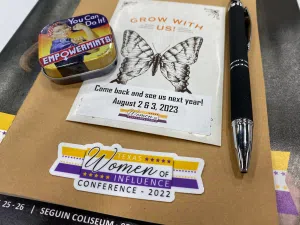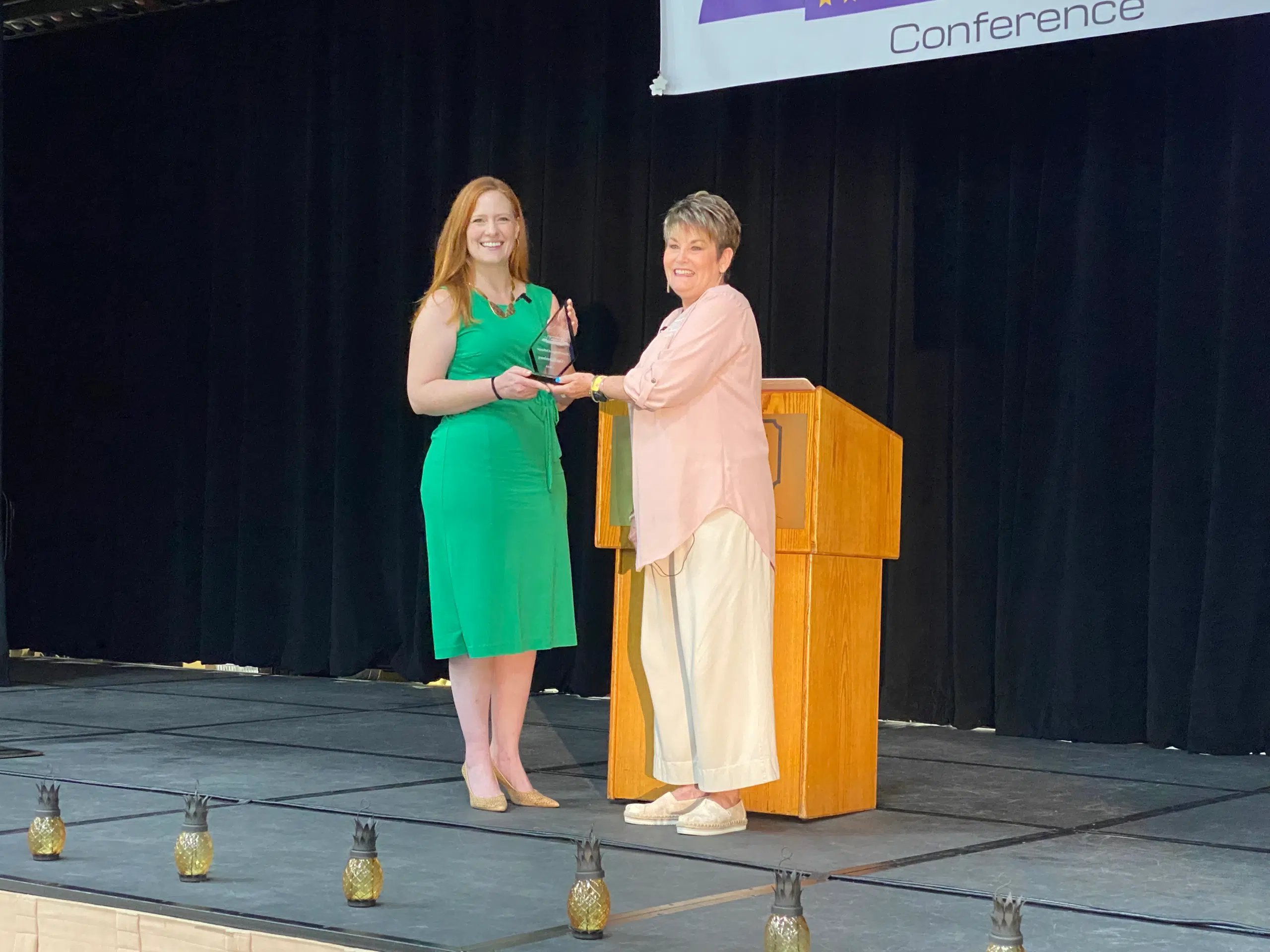Lisa Falkenberg shares the power & importance of storytelling as Texas Women of Influence Honoree, keynote speaker
 (Seguin) — The most embarrassing night of Lisa Falkenberg’s life occurred on the Seguin Coliseum stage. At the time, she was a high schooler, and she was competing in a pageant with a friend. Falkenberg is a self-professed introvert, and it’s easy to imagine why being on stage with a room full of watching eyes might have been so cringe-inducing.
(Seguin) — The most embarrassing night of Lisa Falkenberg’s life occurred on the Seguin Coliseum stage. At the time, she was a high schooler, and she was competing in a pageant with a friend. Falkenberg is a self-professed introvert, and it’s easy to imagine why being on stage with a room full of watching eyes might have been so cringe-inducing.
Long gone are the days of Falkenberg’s teenage awkwardness. The editor of opinion at the Houston Chronicle, and Seguin native, recently returned to the very same stage to be named the Texas Women of Influence Honoree and be awarded a plaque.
Then she took to the mic as the two-day conference’s keynote speaker. She began by thanking her friends, family, and parents, who all were in attendance. Falkenberg also paid special tribute to those who came before her.
Falkenberg has seen immense success in her career as a journalist, having won not one –– but two Pulitzer prizes. During the keynote, she spoke on the importance of storytelling. She also shared the story behind the series of columns that led to her first Pulitzer win. The series detailed the 2005 Harris County case of Alfred Dewayne Brown, who was arrested, charged, and sentenced to death for the murder of police officer Charles Clark.
“He had always maintained his innocence; many of them do,” she said. “But in this particular case some evidence had come up –– just appeared in a homicide detective’s garage. And he brings it to the DA, and it is actually a phone record that backs up his alibi that shows he was at his girlfriend’s apartment instead of the check cashing place with the murderers.”
Upon discovery and review, the district attorney determined Brown deserved a retrial, but bureaucracy and lack of motivation to retrial a convicted cop-killer kept things moving forward slowly. In addition to that, something about the entire case felt off to the columnist.
“I didn’t like them sitting around, and I said, ‘you know what, the Republican DA says give this guy a new trial, so let’s do it,” Falkenberg said. “That was supposed to be one column, but something bothered me. At the time, in the records I had seen, the girlfriend whose house he was at at the time said he was there. She said his alibi was true, but at trial, she ended up testifying against him, saying no –– he wasn’t there. He could have been off with the murderers. She basically helped give him the death penalty.”
So what happened? Was she lying for her boyfriend in her first statement or lying on the stand? And for what reason?
“So I went to the courthouse; not all answers are on Google,” she laughed. “I went through a stack of documents. It was dusty, and they had to dig it out because it was in storage from his trial. And I’m there all day long, and I found a lot of interesting stuff, but probably the last thing I laid my hands on said ‘Grand Jury Report.’ Now, grand juries are secret. You’re not supposed to be handing out the transcript. I didn’t know they had transcripts, but in this particular one, there was a transcript lying right there in the box. And I started reading.”
When a prosecutor thinks they have a case, it must go before a grand jury that decides if there is sufficient evidence to make a formal charge. A grand jury is in place to protect people from malicious prosecution. But, as she read the grand jury transcript, Falkenberg made an alarming discovery. Members of the legal system were also using it to influence decisions and case outcomes.
“This grand jury was threatening the alibi witness –– the girlfriend –– to take away her children, that she’d never get a job flipping burgers –– she was working two jobs at the time. That she’d be locked up, her children would be shipped off somewhere else if she didn’t change her story. You’re reading the transcript and you can’t even believe it’s real.”
Through multiple rounds of testimony, the witness maintained that Brown was at home with her. But repeated threats from prosecutors seemingly wore her down, and she turned on her boyfriend. Then they put her in jail anyway.
But the corruption of the case didn’t stop there. It went right into the jury foreman’s seat.
“I did end up finding the foreman of the grand jury’s name, and I looked him up –– some answers are on Google,” Falkenberg said. “The first thing that came up, James Koteras, he’d given to a police officer’s association. A lot of people donate to police officer’s associations. I keep looking him up –– he can’t be a police officer. They wouldn’t put a foreman of the grand jury in the killing of a police officer –– they wouldn’t place a foreman in that position, would they? Not only was he a police officer, he was a Houston police officer, as was the victim –– and he was friends with the man who died. They put the friend of the man who was murdered on the grand jury deciding whether or not the man accused should go to trial.”
This happened legally, through what was controversially known as the ‘pick-a-pal’ system. Essentially, it granted judges the ability to place an individual of their choosing on a grand jury, thus giving them significant influence over the jury itself. Falkenberg found that across the state, many police officers were serving on grand juries.
Through Falkenberg’s column, state lawmakers saw the issues in the system and passed legislation in 2015 banning pick-a-pal for grand jury selection.
Alfred Dewayne Brown was ultimately found innocent and released. In 2020, he was compensated nearly $2 million for his wrongful imprisonment. Falkenberg says she believes he’s now happily employed as a truck driver.
Her story shows the power of journalism to be a watchdog for the people –– to protect them when the system fails and to inspire change for the better. It also shows that significant change can come from the most unassuming people.
“I encourage you, introverts; there is power in your introversion,” she said. “We actually think longer before making decisions. We have very creative ideas even if we’re not shouting them out in meetings. And maybe email is the way to share those ideas instead of raising your hand in front of everybody. There is much power in you as a leader as well.”
With humble beginnings in Seguin, Falkenberg has crafted a career she believes in. By being named the Texas Women of Influence Honoree, she hopes she can inspire other local women to know their worth and chase their dreams.





